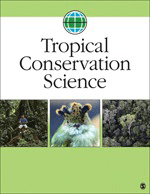
Tropical Conservation Science
metrics 2024
Connecting researchers to inspire ecological stewardship.
Introduction
Tropical Conservation Science, an esteemed journal published by SAGE Publications Inc, plays a pivotal role in the field of environmental science, particularly within the realms of ecology and nature conservation. Established as an Open Access platform since 2008, it facilitates global dissemination of critical research findings dedicated to the preservation of tropical ecosystems. With an impressive impact factor reflected in its Q2 rankings within both ecology and nature landscape conservation categories for 2023, the journal is ranked in the 66th percentile for Environmental Science and maintains a strong position in the academic community. The journal’s scope encompasses a wide array of tropical conservation issues and aims to foster interdisciplinary collaboration among researchers, professionals, and students committed to advancing conservation strategies. Tropical Conservation Science is not merely a publication; it's a vital resource contributing to the safeguarding of our planet's biodiversity.
Metrics 2024
 0.47
0.47 1.70
1.70 2.10
2.10 39
39Metrics History
Rank 2024
Scopus
IF (Web Of Science)
JCI (Web Of Science)
Quartile History
Similar Journals
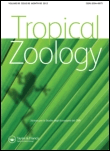
TROPICAL ZOOLOGY
Deepening our understanding of tropical ecosystems.TROPICAL ZOOLOGY is a prestigious academic journal dedicated to advancing knowledge and research in the fields of animal science, zoology, and ecology. Published by PAGEPRESS PUBL, this journal has been an integral part of the scientific community since its inception in 1988, providing a platform for the dissemination of innovative research and discoveries related to tropical wildlife and ecosystems. With an impact factor placing it in the Q3 category for both Animal Science and Zoology, as well as Ecology, Evolution, Behavior, and Systematics, it ranks among the noteworthy publications in these fields. Researchers, professionals, and students will find that TROPICAL ZOOLOGY is an essential resource for the latest findings, fostering a deeper understanding of biodiversity and conservation in tropical environments. The journal is based in the United Kingdom, with additional administrative support from MEDIGROUP in Italy, ensuring a broad international perspective and reach. While it does not operate under an open access model, it remains committed to high-quality peer-reviewed content that contributes significantly to the understanding of tropical ecosystems and the species that inhabit them.
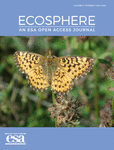
Ecosphere
Connecting researchers to drive ecological discovery.Ecosphere is a leading open-access journal published by WILEY, dedicated to advancing research in the fields of ecology, evolution, behavior, and systematics. Established in 2010 and headquartered in the United States, this innovative journal provides a platform for the exchange of cutting-edge scientific knowledge and discovery, fulfilling its mission to enhance our understanding of ecological systems and their interactions. With a prestigious impact factor reflecting its commitment to high-quality research, Ecosphere is ranked Q1 in both Ecology and Ecology, Evolution, Behavior, and Systematics for 2023, further solidifying its prominence in the scientific community. The journal's scope includes a wide array of topics related to environmental science, making it an essential resource for researchers, professionals, and students aiming to stay at the forefront of ecological research. It offers comprehensive open access options, ensuring that groundbreaking findings are readily available to a global audience, thus fostering collaboration and innovation in the field.

ANIMAL BIODIVERSITY AND CONSERVATION
Empowering conservation through research excellence.ANIMAL BIODIVERSITY AND CONSERVATION is a distinguished open-access journal dedicated to advancing the knowledge of animal biodiversity and conservation practices. Published by the esteemed MUSEU DE CIENCIES NATURALS-ZOOLOGIA in Spain, it provides a platform for researchers and professionals in the fields of Animal Science and Nature Conservation. With its ISSN of 1578-665X and E-ISSN 2014-928X, the journal has been committed to open access publication since 2001, ensuring that valuable research is easily accessible to a global audience. As of 2023, it holds an impressive Q2 ranking in both Animal Science and Zoology and Nature and Landscape Conservation, reflecting its impact and relevance in the scholarly community. The journal covers a broad scope of topics, contributing vital insights and fostering discussions that support the conservation of biodiversity. With key Scopus rankings revealing its standing among the top journals in its field, ANIMAL BIODIVERSITY AND CONSERVATION continues to be an essential resource for researchers, conservationists, and students dedicated to understanding and preserving the rich tapestry of life on our planet.
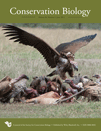
CONSERVATION BIOLOGY
Pioneering research in biodiversity and conservation.CONSERVATION BIOLOGY, published by Wiley, is a leading journal in the field of ecology and conservation, with a focus on disseminating high-quality research that addresses pressing environmental challenges. With a strong impact factor and categorized in the top quartile (Q1) across various relevant fields including Ecology, Evolution, Behavior and Systematics, and Nature and Landscape Conservation, the journal plays a pivotal role in advancing the scientific understanding of biodiversity and conservation practices. Since its establishment in 1987, CONSERVATION BIOLOGY has provided a vital platform for researchers, professionals, and students to share innovative findings and facilitate discussions surrounding ecological sustainability and conservation strategies. Although it is not an open-access publication, it ensures that a wide range of significant research is accessible to the global scientific community. The journal’s rigorous peer-review process and reputation for excellence make it an essential resource for anyone involved in the study of ecology and conservation.
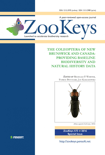
ZooKeys
Unlocking the Secrets of Animal Science and Ecology.ZooKeys, published by Pensoft Publishers, is a premier open access journal dedicated to all aspects of zoology and related biological disciplines. Since its inception in 2008, ZooKeys has emerged as a leading platform in the field, consistently showcasing groundbreaking research that spans diverse areas including animal science, ecology, and paleontology. With an impressive impact factor and categorized in the Q1 quartile for several categories such as Agricultural and Biological Sciences and Insect Science, the journal is recognized for its scholarly contributions, attracting researchers and professionals globally. Located in Sofia, Bulgaria, ZooKeys not only enhances the visibility of its publications through rigorous peer review but also ensures accessibility to vital findings, furthering academic discourse. As the journal continues to converge research efforts through 2024 and beyond, it remains an invaluable resource for students and academics aiming to stay at the forefront of zoological and ecological innovation.

Tropics
Championing research in conservation and environmental science.Tropics, published by the Japan Society for Tropical Ecology, is a prominent journal dedicated to advancing the field of tropical ecology, conservation, and environmental science. With an ISSN of 0917-415X and E-ISSN of 1882-5729, this journal has become a vital resource for researchers, professionals, and students interested in the intricate dynamics of tropical ecosystems. Although it operates as a non-open access publication, it continues to foster academic discourse and collaboration, evident from its various Scopus rankings across categories such as Environmental Science and Agricultural and Biological Sciences. As of 2023, Tropics stands resilient in its mission, providing invaluable insights, promoting sustainable practices, and addressing pressing ecological challenges within tropical environments. The journal’s contributions have been acknowledged since its inception in 1997, making it an essential part of the scientific literature landscape and a key player in supporting tropical ecological research.

Global Ecology and Conservation
Advancing ecological knowledge for a sustainable future.Global Ecology and Conservation, published by Elsevier, stands as a premier open-access journal dedicated to advancing the field of ecology and conservation science. Since its inception in 2014, the journal has facilitated the dissemination of high-quality research, fostering critical dialogue on ecosystem management, biodiversity preservation, and sustainability practices across the globe. With a remarkable ranking within the top quartiles (Q1) in various categories including Ecology, Evolution, Behavior and Systematics, and Nature and Landscape Conservation, it is positioned among the leading resources for researchers and professionals alike. The journal has garnered a notable impact, ranking #65 out of 721 in Ecology, and houses articles that are vital to understanding and addressing the pressing environmental challenges of our time. Available in an open-access format, researchers can freely access and share vital findings, promoting a collaborative approach to ecological research. Global Ecology and Conservation is not just a publication; it is a critical tool for innovation and advocacy in conservation, poised to inspire the next generation of environmental stewards.

BALTIC FORESTRY
Pioneering Knowledge for Sustainable Forestry PracticesBALTIC FORESTRY, published by the INST FORESTRY LRCAF in Lithuania, is a prominent academic journal that serves as a platform for disseminating cutting-edge research in the field of forestry. With an ISSN of 1392-1355, this journal is dedicated to advancing knowledge on sustainable forest management, ecological impacts, and resource conservation, among other vital topics. As of 2023, it has been categorized in the Q3 quartile for forestry in Scopus, indicating its solid reputation among peer-reviewed publications, ranking #95 out of 174 in the realm of Agricultural and Biological Sciences. BALTIC FORESTRY features contributions from researchers across the globe and encourages innovative approaches to solving contemporary challenges in forestry, making it an essential resource for professionals, scholars, and students alike. Although it operates under subscription-based access options, the journal's commitment to fostering academic discourse is unwavering, aiming to bridge the gap between theory and practice in forest science.
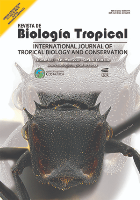
REVISTA DE BIOLOGIA TROPICAL
Championing innovation in agricultural and biological sciences.REVISTA DE BIOLOGIA TROPICAL is a prominent scholarly journal published by the Universidad de Costa Rica that serves as a vital platform for research in the realms of agricultural and biological sciences. Established in 1969, the journal has evolved into a crucial resource, contributing significantly to the understanding of tropical ecosystems and biodiversity. With its current classification in the Q2 quartile for Agricultural and Biological Sciences, it ranks #109 out of 221 journals in its category, reflecting its esteemed position within the academic community. Although it operates under traditional access guidelines, the journal remains committed to disseminating high-quality research that informs conservation efforts and sustainable practices in tropical biology. The journal's diverse scope encompasses a wide range of topics, ensuring relevance for professionals, researchers, and students dedicated to enhancing knowledge and innovation in the biological sciences. As the journal progresses towards 2024, it continues to invite contributions that advance scientific discourse and foster collaboration within the field.
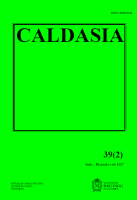
CALDASIA
Cultivating Research to Nourish the WorldCALDASIA is a distinguished open-access journal dedicated to the field of Agricultural and Biological Sciences, published by INST CIENCIAS NATURALES, MUSEO HISTORIA NATURAL since its inception in 1981. Based in Colombia, this journal plays a pivotal role in disseminating scientific knowledge and fostering research collaboration across the globe. With a focus on diverse subjects within the biological sciences, CALDASIA aims to bridge gaps in research and support scholars, professionals, and students in advancing their work. With a 2023 Scopus Ranking of #132 out of 221 in its category, representing a 40th percentile ranking, it holds a solid position in the academic community, particularly recognized for its contributions to miscellaneous areas within agricultural and biological sciences. The journal remains committed to enhancing accessibility, as evidenced by its open-access policy since 2001, thereby ensuring that research findings reach a wider audience without barriers. For those returning to this vibrant field, CALDASIA serves as an essential resource for contemporary findings and discussions that shape environmental and biological scholarship.